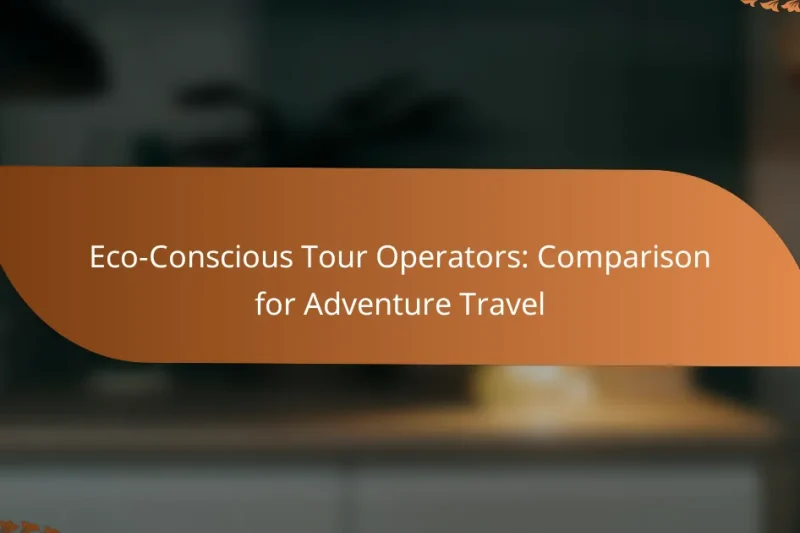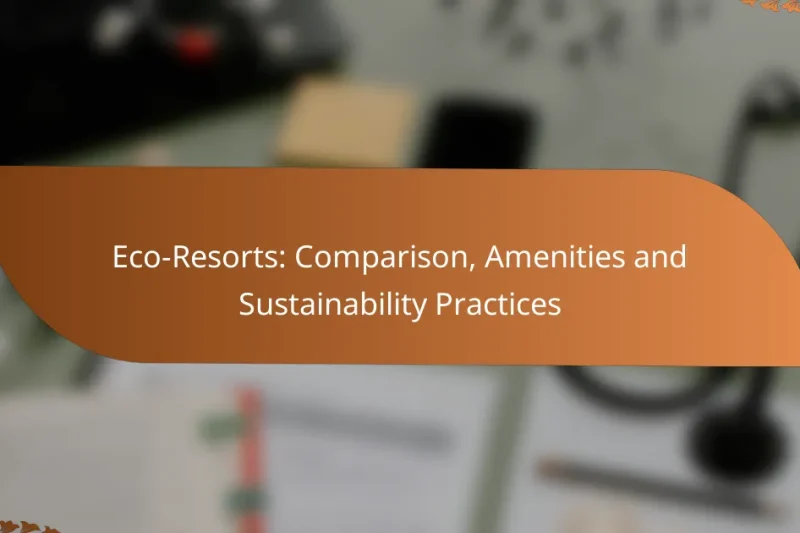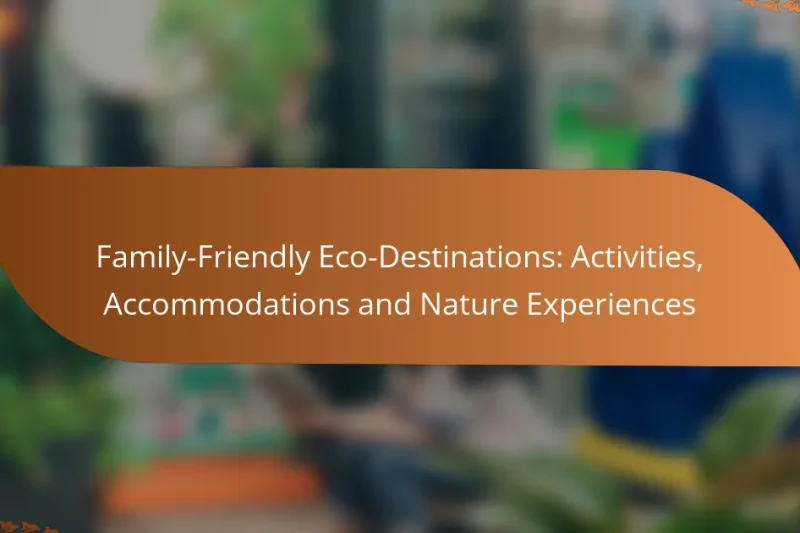As the demand for sustainable travel grows, eco-conscious tour operators are leading the way in adventure … Eco-Conscious Tour Operators: Comparison for Adventure TravelRead more
Eco-travel offers a unique opportunity to explore the world while prioritizing sustainability and conservation. This guide will help you discover the best eco-friendly destinations, accommodations, and adventure activities that minimize environmental impact and support local communities. Whether you're seeking thrilling outdoor experiences or serene nature retreats, embracing eco-travel allows you to connect with nature and make a positive difference.
Eco-Conscious Outdoor Gear: Essentials for Adventure
As outdoor enthusiasts increasingly seek to minimize their environmental impact, eco-conscious outdoor gear has become essential … Eco-Conscious Outdoor Gear: Essentials for AdventureRead more
Eco-Resorts: Comparison, Amenities and Sustainability Practices
Eco-resorts in the USA offer a unique blend of luxury and sustainability, catering to travelers who … Eco-Resorts: Comparison, Amenities and Sustainability PracticesRead more
Budget-Friendly Eco-Resorts: Southeast Asia, Affordability, Comfort
Discovering budget-friendly eco-resorts in Southeast Asia allows travelers to enjoy comfort and sustainability without breaking the … Budget-Friendly Eco-Resorts: Southeast Asia, Affordability, ComfortRead more
Sustainable Lodging: Family-Friendly Options, Eco-Criteria, Location
When planning a family trip, choosing sustainable lodging can enhance your experience while promoting eco-conscious practices. … Sustainable Lodging: Family-Friendly Options, Eco-Criteria, LocationRead more
Eco-Friendly Water Sports: Best Options for Adventure Lovers
For adventure lovers seeking eco-friendly options, water sports offer a thrilling way to connect with nature … Eco-Friendly Water Sports: Best Options for Adventure LoversRead more
Family-Friendly Eco-Destinations: Activities, Accommodations and Nature Experiences
Family-friendly eco-destinations provide the perfect opportunity for families to connect with nature while promoting sustainability. These … Family-Friendly Eco-Destinations: Activities, Accommodations and Nature ExperiencesRead more
Train Travel: Eco-Friendly Benefits, Comfort and Accessibility
Train travel presents an eco-friendly alternative to traditional modes of transportation, significantly reducing carbon emissions and … Train Travel: Eco-Friendly Benefits, Comfort and AccessibilityRead more
Eco-Destinations: Adventure Seekers, Unique Experiences, Natural Wonders
Eco-destinations cater to adventure seekers by offering unique experiences that blend thrilling outdoor activities with a … Eco-Destinations: Adventure Seekers, Unique Experiences, Natural WondersRead more
Eco-Travel Gear Brands: Top Choices for 2025
As we look ahead to 2025, several eco-travel gear brands are making waves with their dedication … Eco-Travel Gear Brands: Top Choices for 2025Read more
What Are the Best Eco-Travel Destinations?
The best eco-travel destinations are places that prioritize sustainability, conservation, and responsible tourism. These locations offer unique experiences while minimizing environmental impact and supporting local communities.
Costa Rica
Costa Rica is renowned for its biodiversity and commitment to eco-tourism. Visitors can explore lush rainforests, pristine beaches, and abundant wildlife while staying in eco-friendly lodges that support conservation efforts.
Key activities include hiking in national parks like Corcovado and Manuel Antonio, birdwatching, and participating in turtle conservation programs. Consider visiting during the dry season from December to April for optimal weather.
New Zealand
New Zealand offers stunning landscapes and a strong focus on sustainability. Eco-travelers can enjoy activities such as hiking the famous Tongariro Alpine Crossing or exploring the geothermal wonders of Rotorua.
Travelers should look for accommodations certified by the EarthCheck program, which ensures environmentally responsible practices. The best time to visit is during the spring (September to November) or fall (March to May) for mild weather and fewer crowds.
Norway
Norway is a leader in sustainable tourism, with initiatives aimed at preserving its natural beauty. Eco-conscious travelers can experience the breathtaking fjords, the Northern Lights, and vibrant cities like Oslo while minimizing their carbon footprint.
Consider using public transport, such as trains and ferries, which are efficient and eco-friendly. The summer months (June to August) are ideal for exploring the outdoors, while winter offers unique opportunities for winter sports and aurora viewing.
Peru
Peru is famous for its rich cultural heritage and stunning landscapes, including the Amazon rainforest and the Andes mountains. Eco-travelers can visit sites like Machu Picchu while supporting local communities through sustainable tourism practices.
Participating in community-based tourism initiatives can enhance your experience and provide direct benefits to local residents. The dry season from May to September is the best time for trekking and outdoor activities.
Thailand
Thailand combines beautiful beaches, rich culture, and a growing focus on eco-tourism. Travelers can explore national parks, engage in wildlife conservation, and support local artisans while enjoying the country's stunning landscapes.
Look for eco-friendly resorts and participate in responsible activities, such as visiting ethical elephant sanctuaries. The cool season from November to February is the most pleasant time to visit, offering comfortable temperatures and less humidity.
How to Choose Eco-Friendly Accommodations?
Choosing eco-friendly accommodations involves looking for places that prioritize sustainability and environmental responsibility. Consider factors such as energy efficiency, waste management practices, and the use of local materials when selecting your stay.
Certified Green Hotels
Certified green hotels meet specific environmental standards set by recognized organizations. Look for certifications like LEED (Leadership in Energy and Environmental Design) or Green Key, which indicate adherence to sustainable practices.
These hotels often implement energy-saving technologies, water conservation systems, and eco-friendly amenities. When booking, check their websites for certification details and sustainability initiatives to ensure they align with your values.
Eco-Lodges
Eco-lodges are designed to blend with their natural surroundings while minimizing environmental impact. They typically use renewable resources, such as solar energy, and focus on local culture and biodiversity.
When selecting an eco-lodge, consider its location and the activities it offers, such as guided nature walks or wildlife conservation programs. These experiences can enhance your understanding of the local ecosystem and support conservation efforts.
Sustainable Hostels
Sustainable hostels provide budget-friendly options while promoting eco-conscious practices. Many of these hostels focus on reducing waste, recycling, and using locally sourced products.
When choosing a sustainable hostel, look for those that offer communal kitchens to minimize food waste and encourage social interaction. Reading reviews can help identify hostels that genuinely prioritize sustainability over mere marketing claims.
What Eco-Adventure Activities Are Available?
Eco-adventure activities encompass a variety of outdoor experiences that promote environmental awareness while providing thrilling adventures. These activities often include wildlife safaris, hiking, canoeing, and opportunities for eco-volunteering, allowing participants to connect with nature and contribute to conservation efforts.
Wildlife Safaris
Wildlife safaris offer an immersive experience in natural habitats, allowing participants to observe animals in their native environments. Popular destinations for safaris include national parks in Africa, such as the Serengeti in Tanzania or Kruger in South Africa, where you can see diverse wildlife.
When planning a safari, consider the best time to visit for optimal wildlife viewing, typically during the dry season. Choose eco-friendly tour operators that prioritize conservation and support local communities to enhance your experience and minimize your ecological footprint.
Hiking and Trekking
Hiking and trekking are excellent ways to explore natural landscapes while promoting physical fitness. Trails vary from easy walks to challenging multi-day treks, with options available in national parks, mountains, and coastal regions worldwide.
Before embarking on a hike, assess your fitness level and choose a trail that matches it. Always follow Leave No Trace principles, carry sufficient water, and be aware of local wildlife. Popular hiking destinations include the Appalachian Trail in the USA and the Inca Trail in Peru.
Canoeing and Kayaking
Canoeing and kayaking provide unique perspectives of waterways and are ideal for exploring lakes, rivers, and coastal areas. These activities can range from leisurely paddles to challenging white-water adventures, catering to all skill levels.
When selecting a canoeing or kayaking trip, consider the water conditions and your experience level. Opt for guided tours in unfamiliar areas to ensure safety and environmental stewardship. Popular spots include the lakes of Canada and the rivers of New Zealand.
Eco-Volunteering
Eco-volunteering combines travel with meaningful work, allowing participants to contribute to environmental conservation projects. Opportunities include wildlife rehabilitation, habitat restoration, and community education programs, often in stunning natural settings.
Research organizations that align with your values and ensure they have a transparent approach to conservation. Be prepared for a range of commitments, from short-term projects to longer stays, and consider the costs involved, which may vary widely based on location and project type.
How to Plan an Eco-Travel Itinerary?
Planning an eco-travel itinerary involves selecting sustainable travel options that minimize environmental impact while maximizing local engagement. Focus on activities that support conservation and community, ensuring your journey is both enjoyable and responsible.
Research Sustainable Options
Start by identifying eco-friendly accommodations, such as eco-lodges or hotels with green certifications. Look for options that utilize renewable energy, practice water conservation, and support local economies.
Consider transportation methods that reduce carbon footprints, like trains or electric vehicles. Many destinations now offer bike rentals or public transit options that are both sustainable and immersive.
Include Local Experiences
Integrate local experiences into your itinerary to support the community and enhance your understanding of the culture. Participate in workshops, farm-to-table dining, or guided tours led by local experts.
Seek out volunteer opportunities or conservation projects that allow you to contribute positively to the environment and community during your travels. This not only enriches your experience but also fosters connections with local residents.
Balance Adventure and Relaxation
Striking a balance between adventure and relaxation is key to a fulfilling eco-travel itinerary. Plan active days filled with hiking, kayaking, or wildlife watching, followed by downtime at serene locations like beaches or nature reserves.
Consider scheduling rest days to recharge, especially after intense activities. This approach helps you appreciate the natural surroundings and supports mental well-being, making your eco-adventure more enjoyable.
What Are the Benefits of Eco-Travel?
Eco-travel offers numerous advantages, including environmental preservation, cultural immersion, and personal well-being. By choosing eco-friendly travel options, you contribute to sustainable practices that protect natural resources and support local communities.
Environmental Preservation
Eco-travel emphasizes sustainability, which helps minimize the negative impact on the environment. Travelers can choose accommodations and activities that prioritize renewable energy, waste reduction, and conservation efforts. For example, staying at eco-lodges that use solar power or participate in reforestation projects can significantly reduce your carbon footprint.
Additionally, eco-travel encourages the protection of wildlife and natural habitats. Participating in guided tours that promote responsible wildlife observation helps ensure that ecosystems remain intact while allowing travelers to appreciate nature's beauty.
Cultural Immersion
Engaging in eco-travel allows for deeper connections with local cultures and communities. Travelers often have the opportunity to participate in traditional practices, such as cooking classes or artisan workshops, which fosters a greater understanding and appreciation of local customs.
Moreover, supporting local businesses through eco-friendly tourism helps sustain the economy and promotes cultural heritage. This can include dining at locally-owned restaurants or purchasing handmade crafts, ensuring that your travel dollars benefit the community directly.
Personal Well-Being
Eco-travel can enhance personal well-being by promoting physical activity and mental health. Activities such as hiking, kayaking, or cycling not only provide exercise but also allow travelers to connect with nature, which has been shown to reduce stress and improve mood.
Furthermore, eco-travel often encourages mindfulness and reflection, as travelers immerse themselves in natural surroundings. This can lead to a more fulfilling travel experience, where the focus shifts from consumerism to appreciation of the environment and personal growth.














